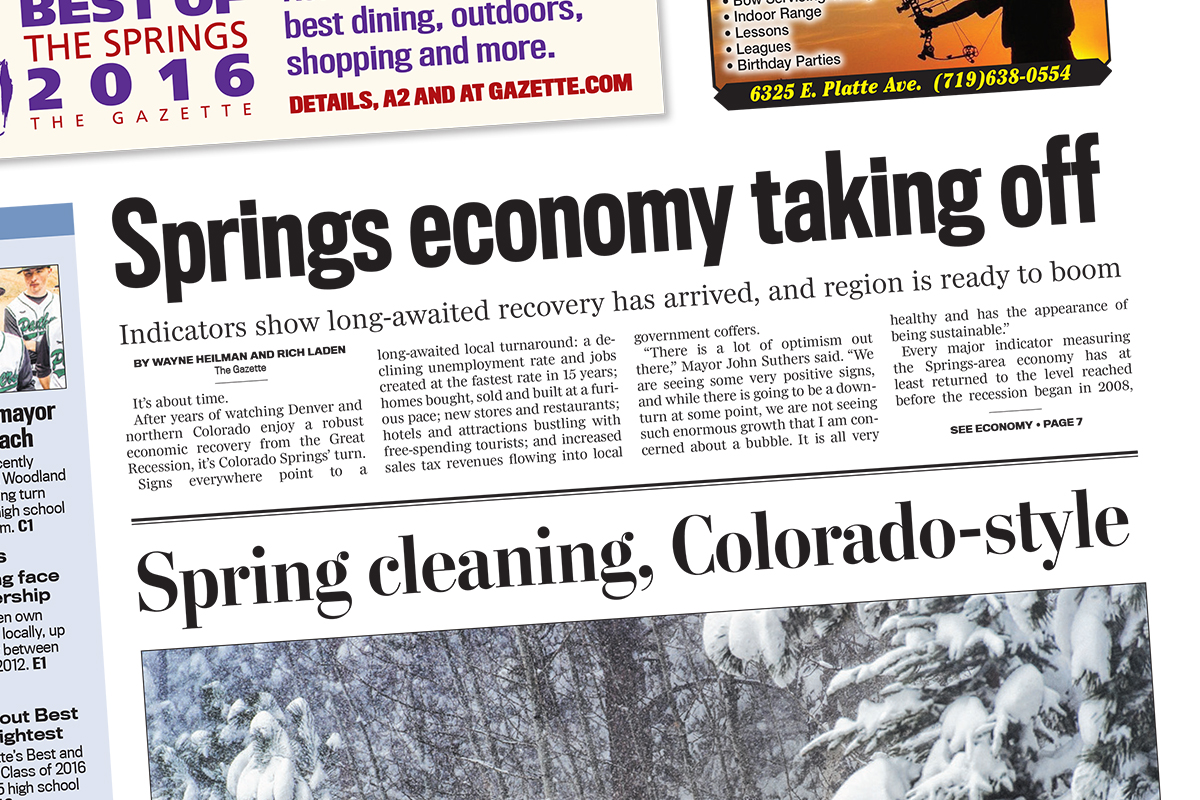
Take Economic Growth Off Our Bucket List
Imagine my dismay last week as my morning newspaper greeted me with this headline:
Bleak Outlook for Global Economy
Fortunately, just below that story on the front page of the business section, I saw:
More Prosperity is Expected for Area
That made me feel better. As did (slightly) this column in the opinion pages:
We Have the ‘Least Ugly’ Economy
And, finally, a few days later, practically jumping off the front page of my local paper:
The subhead on that last one included “region ready to boom,” which really got my adrenaline pumping. Woo hoo! Who doesn’t want a booming economy?
These four economy stories share the spotlight on the Wall of Shame today, because together they perfectly exemplify the pro-growth fairy tales we tell ourselves. Our culture is being led down a garden path to destruction by a steady diet of cheerleading for economic growth, unexamined assumptions about the universal goodness of “more,” and total ignorance of the impossibility and the destructive nature of perpetual growth.
Here are a few examples of the pro-growth bias in these stories that completely ignores science:
In Bleak Outlook for Global Economy (my local newspaper’s headline over an AP story headlined elsewhere as Finance Officials Facing a Chronically Weak Global Economy), AP economics writer Paul Wiseman offered this quote from a growth booster:
“Growth has been too slow for too long,’ Maurice Obstfeld, chief economist of the International Monetary Fund, warned….”
No alternative viewpoint (from a growth realist) was included in the story. Wiseman characterized slow growth as weak, and faster growth as strong. Slower growth is a “downgraded” outlook.
“The IMF on Tuesday downgraded its outlook for growth for most regions and for the global economy as a whole. It now foresees a weaker financial landscape than it did in January.”
Nowhere in this story do we find any acknowledgement of the benefits of slower growth – chief among them, less carbon emissions and slower depletion of vital resources.
In More Prosperity is Expected for Area, Colorado Springs Gazette business reporter Wayne Heilman repeated the same growth-worshipping mantras. Faster growth is “strong.”
“Strong economic growth should continue through the rest of this year both in Colorado and the nation….”
No alternative views were included in a story that reported economist and Federal Reserve Bank executive Alison Felix announced “the Colorado Springs economy is now growing ‘at a healthy pace that looks pretty sustainable….”
This oxymoron flies directly in the face of science, which knows economic growth is NOT sustainable. It is physically impossible to have perpetual economic growth on a finite planet. Yet the reporter treated Felix’s statement as unquestioned and uncontroversial.
Also listed as good news is “the state’s housing industry is surging with new construction…. Much of that construction has resulted from strong population growth both in the state and the Springs.” Why, on a planet of 7.3 billion people facing widespread fresh water crises, and in a state projecting a huge gap between water demand and supply, would a reporter characterize robust population growth as “strong”?
“Strength in consumer spending” is also reported as good news. Where is the alternative view that in a country with 5% of the world’s population consuming 25% of the world’s resources, perhaps LESS consumer spending would be good news?
In Springs Economy Taking Off, Tatiana Bailey, director of the Southern Colorado Economic Forum, demonstrates the same misguided metrics and provides the same oxymoron:
“…construction is going through the roof, and sales of luxury goods are really strong. It is a boom, so people are starting to wonder when the bust will follow, but it seems to me that growth is spread across so many industries that it is sustainable.”
In Robert J. Samuelson’s Washington Post column, We Have the ‘Least Ugly’ Economy, we got yet another dose of pro-growth Kool Aid.
“The American economy is plodding along at about a 2 percent annual growth rate, which is much slower than most past periods, but compared with most other economies, looks stellar.”
He laments projected 3% annual global economic growth (we WERE experiencing 4% global economic growth from 1997 to 2006).
“An extra percentage point of growth is $750 billion worth of added goods and services. The gap between 3 percent and 4 percent expands every year. After a decade, it would exceed $7.5 trillion in inflation-adjusted dollars.”
 Imagine the pollution, the resource extraction, and the CO2 emission that would come with that extra $750 billion worth of economic activity. Was that considered by Samuelson? No. The fact is, if it were possible for the global economy to grow 3% per year, without very quickly decimating the planet and rendering it uninhabitable by humankind, we’d have an economy 32 times the size of today’s in just 120 years, and 1 billion times larger in 720 years. It’s long past time to take economic growth off our bucket list. It is hastening us to the day our species kicks the bucket. Yet with this kind of brainwashing distributed daily in the media, championing growth as an unalloyed good, it’s no wonder we continue to march right toward that cliff.
Imagine the pollution, the resource extraction, and the CO2 emission that would come with that extra $750 billion worth of economic activity. Was that considered by Samuelson? No. The fact is, if it were possible for the global economy to grow 3% per year, without very quickly decimating the planet and rendering it uninhabitable by humankind, we’d have an economy 32 times the size of today’s in just 120 years, and 1 billion times larger in 720 years. It’s long past time to take economic growth off our bucket list. It is hastening us to the day our species kicks the bucket. Yet with this kind of brainwashing distributed daily in the media, championing growth as an unalloyed good, it’s no wonder we continue to march right toward that cliff.
Tags: economic growth, sustainability
Trackback from your site.